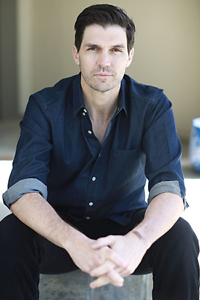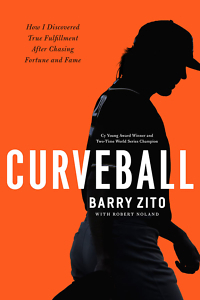No Atheists in the Bullpen
Barry Zito was the hottest, highest-paid pitcher in the major leagues. So why did he feel so lost?
In the forward to Curveball, Nashville resident Barry Zito’s memoir of his life on and off the baseball field, legendary Oakland A’s manager Billy Beane rattles off a few of his former star pitcher’s statistics. “Six straight seasons of 200-plus innings, 102 wins, a 3.55 ERA, five playoff appearances in seven years, and a Cy Young award in 2002 at the age of twenty-four,” Beane crows. And this was just with the A’s!
 In 2006, Zito signed a $126 million contract — the highest amount ever yet paid for a pitcher — with the San Francisco Giants. “I was idolized in a way I never had been before,” Zito recalls, and he quickly adopted a lifestyle to match, buying mansions, dating models, and spending the offseason partying like the “baller” he’d grown up to be. The goofy, laid-back surfer dude from San Diego, as famous for idiosyncrasies like practicing yoga in the outfield as for his phenomenal left arm, was on top of the world.
In 2006, Zito signed a $126 million contract — the highest amount ever yet paid for a pitcher — with the San Francisco Giants. “I was idolized in a way I never had been before,” Zito recalls, and he quickly adopted a lifestyle to match, buying mansions, dating models, and spending the offseason partying like the “baller” he’d grown up to be. The goofy, laid-back surfer dude from San Diego, as famous for idiosyncrasies like practicing yoga in the outfield as for his phenomenal left arm, was on top of the world.
And then it all came crashing down.
Curveball begins at the nadir. In October 2010, the Giants and the Padres were duking it out for first place in the National League West, but Zito was in a slump. For the Giants, he’d been an expensive disappointment; when he took the mound for the penultimate game of his third season in San Francisco, he’d lost 8 of his last 10 starts. “[I]n front of a packed AT&T Park, I failed. Miserably. I walked two batters with the bases loaded in the first inning and from there the downward spiral began.” Though the Giants rallied to clinch the division championship and went on to win their first-ever World Series, Zito — cut from the roster after his dismal performance — spent the postseason hunched on the bench in shame. “Head down, music cranked, black Giants hoodie always over my head, with no eye contact with anyone,” he writes. During the victory parade, fans paused their ecstatic cheering to jeer and curse at Zito as he rode numbly by.
 Curveball describes in detail the harrowing trajectory of Zito’s charmed, then cursed, then charmed again career, but it’s really a spiritual coming-of-age tale. This may put off readers who aren’t religious, but they’d do well to suspend their disbelief. The particulars of Zito’s quest will make your jaw drop.
Curveball describes in detail the harrowing trajectory of Zito’s charmed, then cursed, then charmed again career, but it’s really a spiritual coming-of-age tale. This may put off readers who aren’t religious, but they’d do well to suspend their disbelief. The particulars of Zito’s quest will make your jaw drop.
It turns out that all those journalists who poked fun at Zito for stuff like meditating in the locker room didn’t know the half of it. In 1963, Zito’s grandmother founded a “metaphysical church” called The Teaching of the Inner Christ. His mother worked there full-time as a pastor throughout his childhood. When Barry was 5, he was introduced to (and actually saw) his own Inner Christ: “My mom said I could call on him any time I was sad or afraid.”
Meanwhile, Zito’s father, a musician/talent manager/hustler, became laser-focused on his son’s career. Right away, “he became too attached, even to the point of saying things like, ‘When we are on the mound,’” Zito recalls. And he micromanaged Zito’s life to the point of insanity. As Zito tells it, he never quite knew whether his dad loved him or just his ability to pitch.
The T.I.C. taught its disciples that everyone could be Christ. If you worked hard enough, you could essentially save yourself. With the focus and discipline of a budding professional athlete, young Barry internalized the message completely. Later, when his pitching faltered, he scrambled to develop his spiritual authority, latching onto anything he thought might help.
Zito ran the spiritual gamut. He cycled through lifestyle coaches, gurus, sports psychologists, and healers and repeatedly plundered the self-help aisle at Barnes & Noble. He swallowed pills full of milk from his spirit animal (a lion). He bought a bar of 24-carat gold, sent it to a lab to be ingested by bacteria, then swallowed their excrement. (The subsequent euphoria reminded him of doing crystal meth as a teenager.) Finally, as a last resort, he tried reading the Bible. Unlike everything else, it stuck.
Curveball isn’t all or even mostly about religion. The book also delivers celebrity gossip, humor, romance, and just the right amount of baseball — enough to satisfy aficionados, but not so much that rookie readers get bored. Zito’s earnest, affable voice keeps the pages turning, and even when he proselytizes (which he does, a tiny bit, right at the end), his good-natured charisma carries the day. By the time he finds true happiness in God, even his most diehard atheist fans will be standing up in their seats, cheering like mad, rooting for Zito to triumph.

From 2012 to 2016, Fernanda Moore was the fiction critic for Commentary. Her work has also appeared in The New York Times Magazine, Marie Claire, New York, and Southern Living, among others.


